国际商会托收统一规则(URC522)(中文版).doc
ucr522
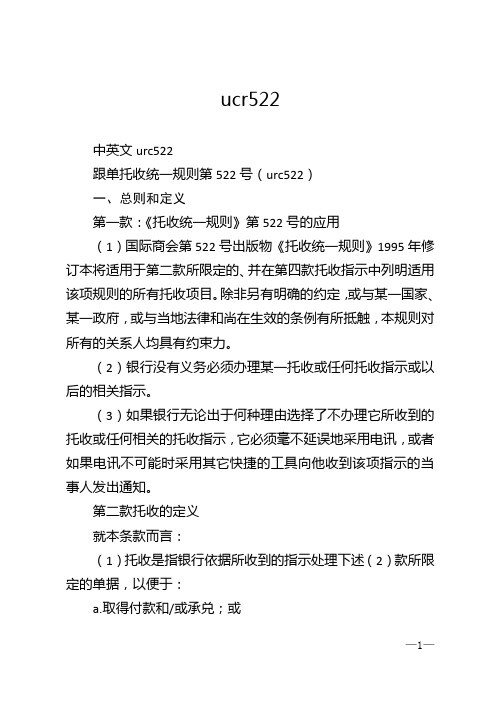
ucr522中英文urc522跟单托收统一规则第522号(urc522)一、总则和定义第一款:《托收统一规则》第522号的应用(1)国际商会第522号出版物《托收统一规则》1995年修订本将适用于第二款所限定的、并在第四款托收指示中列明适用该项规则的所有托收项目。
除非另有明确的约定,或与某一国家、某一政府,或与当地法律和尚在生效的条例有所抵触,本规则对所有的关系人均具有约束力。
(2)银行没有义务必须办理某一托收或任何托收指示或以后的相关指示。
(3)如果银行无论出于何种理由选择了不办理它所收到的托收或任何相关的托收指示,它必须毫不延误地采用电讯,或者如果电讯不可能时采用其它快捷的工具向他收到该项指示的当事人发出通知。
第二款托收的定义就本条款而言:(1)托收是指银行依据所收到的指示处理下述(2)款所限定的单据,以便于:a.取得付款和/或承兑;或b.凭以付款或承兑交单;或c.按照其他条款和条件交单。
(2)单据是指金融单据和/或商业单据。
a.金融单据是指汇票、本票、支票或其他类似的可用于取得款项支付的凭证;b.商业单据是指发票、运输单据、所有权文件或其他类似的文件,或者不属于金融单据的任何其他单据。
(3)光票托收是指不附有商业单据的金融单据项下的托收。
(4)跟单托收是指:a.附有商业单据的金融单据项下的托收;b.不附有金融单据的商业单据项下的托收。
第三款托收的关系人(1)就本条款而言,托收的关系人有:a.委托人即委托银行办理托收的有关人;b.寄单行即委托人委托办理托收的银行;c.代收行即除寄单行以外的任何参与处理托收业务的任何银行;(2)付款人即根据托收指示向其提示单据的人。
二、托收的形式和结构第四款托收指示(1)a.所有送往托收的单据必须附有一项托收指示,注明该项托收将遵循《托收统一规则》第522号文件并且列出完整和明确的指示。
银行只准允根据该托收指示中的命令和本规则行事;b.银行将不会为了取得指示而审核单据;c.除非托收指示中另有授权,银行将不理会来自除了他所收到托收的有关人/银行以外的任何有关人/银行的任何指令。
托收统一规则中英文完整版
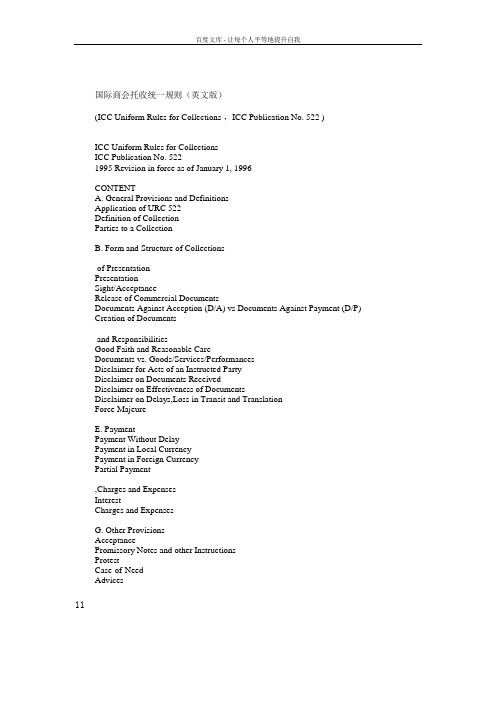
国际商会托收统一规则(英文版)(ICC Uniform Rules for Collections ,ICC Publication No. 522 )ICC Uniform Rules for CollectionsICC Publication No. 5221995 Revision in force as of January 1, 1996CONTENTA. General Provisions and DefinitionsApplication of URC 522Definition of CollectionParties to a CollectionB. Form and Structure of Collectionsof PresentationPresentationSight/AcceptanceRelease of Commercial DocumentsDocuments Against Acception (D/A) vs Documents Against Payment (D/P) Creation of Documentsand ResponsibilitiesGood Faith and Reasonable CareDocuments vs. Goods/Services/PerformancesDisclaimer for Acts of an Instructed PartyDisclaimer on Documents ReceivedDisclaimer on Effectiveness of DocumentsDisclaimer on Delays,Loss in Transit and TranslationForce MajeureE. PaymentPayment Without DelayPayment in Local CurrencyPayment in Foreign CurrencyPartial Payment,Charges and ExpensesInterestCharges and ExpensesG. Other ProvisionsAcceptancePromissory Notes and other InstructionsProtestCase-of-NeedAdvices11A. General Provisions and DefinitionsArticle 1Application of URC 522a. The Uniform Rules for Collections, 1995 Revision, ICC Publication , shall apply to all collections as defined in Article 2 where such rules are incorporated into the text of the “collection instruction” referred to in Article 4 and are binding on all parties thereto unless otherwise expressly agreed or contrary to the provisions of a national,state or local law and/or regulation which cannot be departed from.b. Banks shall have no obligation to handle either a collection or any collection instruction or subsequent related instructions.c. If a bank elects, for any reason, not to handle a collection or any related instructions received by it, it must advise the party from whom it received the collection or the instructions by telecommunication or, if that is not possible, by other expeditious means, without delay.Article 2Definition of CollectionFor the purposes of these Articles:a.“Collection”means the handling by banks of documents as defined in sub-Article 2 (b), in accordance received, in order to:I. obtain payment and/or acceptance, orII. deliver documents against payment and/or against acceptance,orIII. deliver documents on other terms and conditions.b.“Documents”means financial documents and/or commercial documents:I. “Financial documents”means bills of exchange,promissory notes, cheques, or other similar instruments used for obtaining the payment of money;II. “Commercial documents” means invoice,transport documents,documents of title or other similar documents,or any other documents whatsoever, not being financial documents.c.”Clean collection” means collection of financial documents not accompanied by commercial documents.d.”Documentary collection”means collection of:I. financial documents accompanied by commercial documents;documents not accompanied by financial documents.Article 3a. For the purposes of these Articles the “parties thereto” are:I. the “principal” who is the party entrusting the handling of a collection to a bank;II. the “remitting bank” which is the bank to which the principal has entrusted the handling of a collection;III. “collecting bank” which is any bank,other than the remitting bank, involved in processing the collection;IV. the “presenting bank” which is the collecting bank making presentation to the drawee.b. The “drawee” is the one to whom presentation is to be made in accordance with the collection instruction.22B.Form and Structure of CollectionsArticle 4Collection InstructionA i. All documents sent for collection must be accompanied by a collection instruction indicating that the collection is subject to URC522 and giving complete and precise instructions. Banks are only permitted to act upon the instructions given in such collection instruction,and in accordance with these Rules.ii. Banks will not examine documents in order to obtain instructions.iii. Unless otherwise authorized in the collection instruction, banks will disregard any instructions from any party/bank other than the party/bank from whom they received the collections.B A collection instruction should contain the following items of information,as appropriate.i. Details of the bank from which the collection was received including full name,postal and SWIFT addresses,telex,telephone,facsimile numbers and referece.ii. Details of the principal including full name, postal address,and if applicabletelex,telephone and facsimile numbers.iii. Details of the drawee including full name,postal address,or the domicile at which presentation is to be made and if applicable telex, telephone and facsimile numbers.iv. Details of the presenting bank,if any,including full name,postal address,and if applicable telex, telephone and facsimile numbers.v. Amount(s) and currency(ies) to be collected.vi. List of documents enclosed and the numerial count of each document.vii. a) Terms and conditions upon which payment and/or acceptance is to be obtained.b) Terms of delivery of documents against:1) payment and/or acceptance2)other terms and conditionsIt is the responsibility of the party preparing the collection instruction to ensure that the terms for the delivery of documents are clearly and unambiguously stated, otherwise banks will not be responsible for any consequences arising therefrom.viii. Charges to be collected, indicating whether they may be waived or not.ix. Interest to be collected, if applicable, indicating whether it may be waived or not, including:a) rate of interestb) interest periodc) basis of calculation (for example 360 or 365 days in year) as applicable.x. Method of payment and form of payment advice.xi. Instrucitons in case of non-payment, non-acceptance and/or non-compliance with other instructions.i. Collection instructions should bear the complete address of the drawee or of the domicile at which the presentation is to be made. If the address is incomplete or incorrect, the collecting bank may, without any liability and responsibility on its part, endeavour to ascertain the proper address.ii. The collecting bank will not be liable or responsible for any ensuing delay as a result of an address being provided.B. Form of PresentationArticle 533Presentationa. For the purposes of these Articles, presentation is the procedure whereby the presenting bank makes the documents available to the drawee as instructed.b. The collection instruction should state the exact period of time within which any action is to be taken by the drawee.Expressions such as “first”, “prompt”,”immediate”, and the like should not be used in connection with presentation or with reference to any period of time within which documents have to be taken up or for any other action that is to be taken by the drawee. If such terms are used banks will disregard them.c. Documents are to be presented to the drawee in the form in which they are received, except that banks are authorized to affix any necessary stamps, at the expense of the party from whom they received the collection unless otherwise instructed, and to make any necessary endorsements or place any rubber stamps or other identifying marks or symbols customary to or required for the collection operation.d. For the purpose of giving effect to the instructions of the principal, the remitting bank will utilize the bank nominated by the principal as the collecting bank. In the absence of such nomination, the remitting bank will utilize any bank of its own, or another bank’s choice in the country of payment or acceptance or in the country where other terms and conditions have to be complied with.e. The documents and collection instruction may be sent directly by the remitting bank to the collecting bank or through another bank as intermediary.f. If the remitting bank does not nominate a specific presenting bank, the collecting bank may utilize a presenting bank of its choice.Article 6Sight/AcceptanceIn the case of documents payable at sight the presenting bank must make presentation for payment without delay.In the case of documents payable at a tenor other than sight the presenting bank must, where acceptance is called for, make presentation for acceptance without delay, and where payment is called for, make presentation for payment not later than the appropriate maturity date.Article 7Release of Commercial DocumentsDocuments Against Acceptance (D/A) vs. Documents Against Payment (D/P)should not contain bills of exchange payable at a future date with instruction that commercial documents are to be delivered against payment.b. If a collection contains a bill of exchange payable at a future date, the collection instruction should state whether the commercial documents are to be released to the drawee against acceptance (D/A) or against payment (D/P).In the absence of such statement commercial documents will be released only against payment and the collecting bank will not be responsible for any consequences arising out of any delay in the delivery of documents.c. If a collection contains a bill of exchange payable at a future date and the collection instruction indicates that commercial documents are to be released against payment, documents will be released only against such payment and the collecting bank will not be responsible for any consequences arising out of any delay in the delivery of documents.Article 8Creation of Documents44Where the remitting bank instructs that either the collecting bank or the drawee is to create documents (bills of exchange promissory notes, trust receipts,letters of undertaking or other documents) that were not included in the collection, the form and wording of such documents shall be provided by the remitting bank, otherwise the collecting bank shall not be liable or responsible for the form and wording of any such document provided by the collecting bankand/or the drawee.C. Liabilities and ResponsibilitiesArticle 9Good faith and Reasonable CareBanks will act in good faith and exercise reasonable care.Article 10Documents vs. Goods/Services/Performancesshould not be dispatched directly to the address of a bank or consigned to or to the order of a bank without prior agreement on the part of that bank.Nvertheless, in the event that goods are dispatched directly to the address of a bank or consigned to or to the order of a bank for release to a drawee against payment or acceptance or upon other terms and conditions without prior agreement on the part of that bank, such bank shall have no obligation to take delivery of the goods, which remain at the risk and responsibility of the party dispatching the goods.b. Banks have no obligation to take any action in respect of the goods to which a documentary collection relates, including storage and insurance of the goods even when specific instructions are given to do so. Banks will only take such action if, when, and to the extent that they agree to do so in each case, notwithstanding the provisions of sub-article 1 (c), this rule applies even in the absence of any specific advice to this effect by the collecting bank.c. Nevertheless, in the case that banks take action for the protection of the goods, whether instructed or not, they assume no liability or responsibility with regard to the fate and/or condition of the goods and/or for any acts and/or omissions on the part of any third parties entrusted with the custody and/or protection of the goods. However, the collecting bank must advise without delay the bank from which the collection instruction was received of any such action taken.d. Any charges and/or expensed incurred by banks in connection with any action taken to protect the goods will be for the account of the party from whom they received the collection.e. i. Notwithstanding the provisions of sub-article 10 (a), where the goods are consigned to or the order of the collecting bank and the drawee has honoured the collection by payment, acceptance or other terms and conditions, and the collecting bank arranges for the authorized the collecting bank to do so.a collecting bank on the instructions of the remitting bank or in terms of sub-article 10 (e) i, arranges for the release of the goods, the remitting bank shall indemnify such collecting bank for all damages and expenses incured.Article 11Disclaimer For Acts of an Instructed Partya. Banks utilizing the services of another bank or other banks for the purposes of giving effect to the instructions of the principal, do so for the account and at the risk of such principal.b. Banks assume no liability or responsibility should the instructions they transmit not be carried out, even if they have themselves taken the initiative in the choice of such other bank(s).c. A party instructing another party to perform services shall be bound by and liable to indemnify the instructed party against all obligations and responsibilities imposed by foreign laws and usages.55Article 12Disclaimer on Documents Receivedmust determine that the documents received appear to be as listed in the collectioninstruction and must advise by telecom-munication or, if that is not possible, by other expeditious means, without delay, the party from whom the collection instruction was received of any documents missing, or found t be other than listed.Banks have no further obligation in this respect.b. If the documents do not appear to be listed, the remitting bank shall be precluded from disputing the type and number of documents received by the collecting bank.c. Subject to sub-article 5 (c) and sub-article 12 (a) and 12 (b) above, banks will present documents as received without further examination.Article 13Disclaimer on Effectiveness of DocumentsBanks assume no liability or responsibility ofr the form,sufficiency,accuracy,genuineness,falsification or legal effect of any document (s) or superimposed thereon; nor do they assume any liability, condition,packing ,delivery, value of existence of the goods represented by any document (s),or for the good faith or acts and/oromission,solvency,performance or standing of the consignors, the carriers,the forwarders,the consignees or the insurers of the goods, or any other person whomsoever.Article 14Disclaimer on Delays,Loss in Transit and Translationassume no liability or responsibility for the consequences arising out of delay and/or loss in transit of any message (s), letter(s) or document(s), or for delay,mutilation or other error(s) arising in transmission of any telecommunication or for error(s) in translation and/or interpretation of technical terms.b. Banks will not be liable or responsible for any delays resulting from the need to obtain clarification of any instructions received.Article 15Force MajeureBanks assume no liability or responsibility for consequence arising out of the interruption of their business by Acts of God, riots,civil commotios,insurrections, wars, or any other causes beyond their control or by strikes or lockouts.D. PaymentArticle 16Payment Without Delaycollected (less charges and/or disbursements and/or expenses where applicable) must be made available without delay to the party from whom the collection instruction was received in accordance with the terms and conditions of the collection instruction.b. Notwithstanding the provisions of sub-article 1 (c) and unless otherwise agreed, the collecting bank will effect payment of the amounts collected in favour of the remitting bank only.Article 17Payment in Local Currency66In the case of documents payable in the currency of the country of payment (local currency), the presenting bank must, unless otherwise instructed in the collection instruction, release the documents to the drawee against payment in local currency only if such currency is immediately available for disposal in the manner specified in the collection instruction.Article 18Payment in Foreign CurrencyIn the case of documents payable in a currency other than of the country of payment (foreign currency), the presenting bank must, unless otherwise instructed in the collectioninstruction,release the documents to the drawee against payment in the designed foreign currency only if such foreign currency can immediately remitted in accordance with the instructions given in the collection instruction.Article 19Partial Paymentsrespect of clean collections, partial payments may be accepted if and to the extent to which and on the conditions on which partial payments are authorized by the law in force in the place of payment. The financial document(s) will be released to the drawee only when full payment thereof has been received.b. In respect of documentary collection, partial payments will only be accepted if specifically authorized in the collection instruction. However,unless otherwise instructed, the presenting bank will release the documents to the drawee only after full payment has been received, and the presenting bank will not be responsible for any consequence arising out of any delay in the delivery of documents.all cases partial payments will be accepted only subject to compliance with the provisions of either Article 17 or Article 18 as appropriate. Partial payment, if accepted, will be dealt with in accordance with the provisions of Article 16.E. Interest, Charges and ExpensesArticle 20Interestthe collection instruction specifies that interest is to be collected and the drawee refuses to pay such interest, the presenting bank may deliver the document (s) against payment of acceptance or on other terms and conditions as the case may be, without collecting such interest, unless sub-article 20 (c) applies.b. Where such interest is to be collected, the collection instruction must specify the rate of interest,interest period and basis of calculation.the collection instruction expressly states that interest may not be waived and the drawee refuses to pay such interest the presenting abnk will not deliver document and will not be responsible for any consequences arising out of any delay in the delivery of document(s). When payment of interest has been refused, the presenting bank must inform by telecommunication or, if that is not possible, by other expeditious means without delay the bank from which the collection instruction was received.Article 21Charges and Expensesthe collection instruction specifies that collection charges and/or expenses are to be ofr account of the drawee and the drawee refuses to pay them, the presenting bank may deliver the77document(s) against payment or acceptance or on other terms and conditions as the case may be, without collecting charges and/or expenses,unless sub-article 21 (b) applies.Whenever collection charges and/or expenses are so waived they will be for the account of the party from whom the collection was received and may be deducted from the proceeds.the collection instruction expressly states that charges and/or expenses may not be waived and the drawee refuses to pay such charges and/or expenses, the presenting bank will not deliver documents and will not be responsible for any consequence arising out of any delay in the delivery of the document(s). When payment of collection charges and/or expenses has been refused the presenting bank must inform by telecommunication or, if that is not possible, by other expeditious means without delay the bank from which the collection instruction was received.all cases where in the express terms of a collection instruction or under these Rules, disbursements and/or expenses and/or collection charges are to be borne by the principal, the collecting bank(s) shall be entitled to recover promptly outlays in respect ofdisbursements,expenses and charges from the bank form which the collection instruction ws received, and the remitting bank shall be entitled to recover promptly from the principal any amount so paid out by it,together with its own disbursements,expenses and charges,regardless of the fate of the collection.reserve the right to demand payment of charges and/or expenses in advance from the party from whom the collection instruction was received, to cover costs in attempting to carry out any instructions, and pending receipt of such payment also reserve the right not to carry out such instructions.F. Other ProvisionsArticle 22AcceptanceThe presenting bank is responsible for seeing that the form of the acceptance of a bill of exchange appears to be complete and correct, but is not responsible for the genuineness of any signature or for the authority of any signatory to sign the acceptance.Article 23Promissory Notes and Other InstructionsThe presenting bank is not responsible fo the genuineness of any signature or for the authority of any signature to sign a promissory note, receipt, or other instruments.Article 24ProtestThe collection instruction should give specific instructions regarding protest (or other legal process in lieu thereof), in the event of non-payment or non-acceptance.In the absence of such specific instructions, the banks concerned with the collection have no obligation to have the document(s) protested (or subjected to other legal process in lieu thereof) for non-payment or non-acceptance.Any charges and/or expenses incurred by banks in connection with such protest, or other legal process,will be for the account of the party from whom the collection instruction was received.Article 25Case-of-NeedIf the principal nominates a representative to act as case-of-need in the event of non-payment and/or non-acceptance the collection instruction should clearly and fully indicate the powers of 88such case-of-need. In the absence of such indication banks will not accept any instructions from the case-of-need.Article 26AdvicesCollecting banks are to advise fate in accordance with the following rules:of AdviseAll advices of information from the collecting bank to the bank from which the collection instruction was received, must bear appropriate details including, in all cases,the latter bank’s reference as stated in the collection instruction.of AdviceIt shall be the responsibility of the remitting bank to instruct the collecting bank regarding the method by which the advices detailed in (c) i, (c) ii and (c) iii are to be given. In the absence of such instructions, the collecting bank will send the relative advices by the method of its choice at the expense of the bank from which the collection instruction was received.c. i. Advice of PaymentThe collecting bank must send without delay advice of payment to the bank from which the collection instruction was received, detailing the amount or amounts collected,charges and/or disbursements and/or expenses deducted, where appropriate, and method of disposal of the funds.of AcceptanceThe collecting bank must send without delay advice of acceptance to the bank from which the collection instruction was received.of Non-payment and/or Non-acceptanceThe presenting bank should endeavour to ascertain the reasons for non-payment and/or non-acceptance and advise accordingly, without delay,the bank from which it received the collection instruction.The presenting bank must send without delay advice of non-payment and/or advice of non-acceptance to the bank form which it received the collection instruction.On receipt of such advice the remitting bank must give appropriate instructions as to the further handling of the documents. If such instructions are not received by the presenting bank within 60 days after its advice of non-payment and/or non-acceptance, the documents may be returned to the bank from which the collection instruction was received without any further responsibility on the part of the presenting bank.一、总则和定义第一款《托收统一规则》第522号的应用。
国际结算URC522要点

国际商会托收统一规则(URC 522)(1995 年修订本1996 年1 月1 日起施行)一、总则和定义第一款《托收统一规则》第 522 号的应用(1)国际商会第 522 号出版物《托收统一规则》1995 年修订本将适用于第二款所限定的、并在第四款托收指示中列明适用该项规则的所有托收项目。
除非另有明确的约定,或与某一国家、某一政府,或与当地法律和尚在生效的条例有所抵触,本规则对所有的关系人均具有约束力。
(2)银行没有义务必须办理某一托收或任何托收指示或以后的相关指示。
(3)如果银行无论出于何种理由选择了不办理它所收到的托收或任何相关的托收指示,它必须毫不延误地采用电讯,或者如果电讯不可能时采用其它快捷的工具向他收到该项指示的当事人发出通知。
第二款托收的定义就本条款而言:(1)托收是指银行依据所收到的指示处理下述(2)款所限定的单据,以便于:a.取得付款和/或承兑;或b.凭以付款或承兑交单;或c.按照其他条款和条件交单。
(2)单据是指金融单据和/或商业单据。
a.金融单据是指汇票、本票、支票或其他类似的可用于取得款项支付的凭证;b.商业单据是指发票、运输单据、所有权文件或其他类似的文件,或者不属于金融单据的任何其他单据。
(3)光票托收是指不附有商业单据的金融单据项下的托收。
(4)跟单托收是指:a.附有商业单据的金融单据项下的托收;b.不附有金融单据的商业单据项下的托收。
第三款托收的关系人(1)就本条款而言,托收的关系人有:a.委托人即委托银行办理托收的有关人;b.寄单行即委托人委托办理托收的银行;c.代收行即除寄单行以外的任何参与处理托收业务的任何银行;(2)付款人即根据托收指示向其提示单据的人。
二、托收的形式和结构第四款托收指示(1) a.所有送往托收的单据必须附有一项托收指示,注明该项托收将遵循《托收统一规则》第 522 号文件并且列出完整和明确的指示。
银行只准允根据该托收指示中的命令和本规则行事;b.银行将不会为了取得指示而审核单据;c.除非托收指示中另有授权,银行将不理会来自除了他所收到托收的有关人/银行以外的任何有关人/银行的任何指令。
《国际商会托收统一规则》
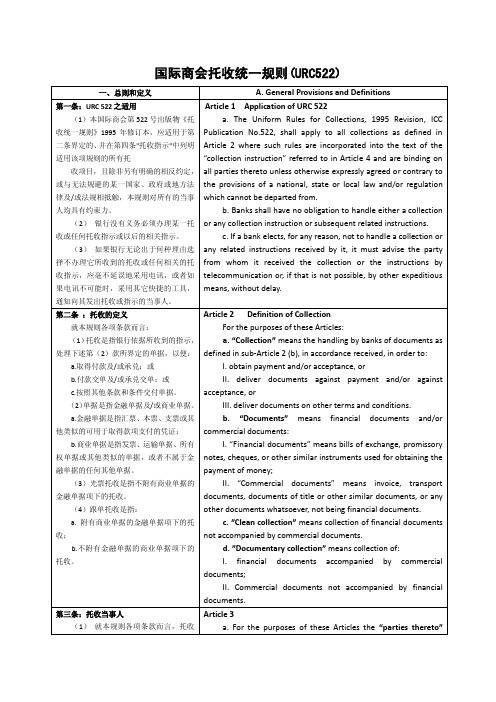
are: I. the “principal” who is the party entrusting the handling of a collection to a bank; II. the “remitting bank” which is the bank to which the principal has entrusted the handling of a collection; III. “collecting bank” which is any bank, other than the remitting bank, involved in processing the collection; IV. the “presenting bank” which is the collecting bank making presentation to the drawee. b. The “drawee” is the one to whom presentation is to be made in accordance with the collection instruction. B. Form and Structure of Collections Article 4 Collection Instruction A i. All documents sent for collection must be accompanied by a collection instruction indicating that the collection is subject to URC522 and giving complete and precise instructions. Banks are only permitted to act upon the instructions given in such collection instruction, and in accordance with these Rules. ii. Banks will not examine documents in order to obtain instructions. iii. Unless otherwise authorized in the collection instruction, banks will disregard any instructions from any party/bank other than the party/bank from whom they received the collections. B A collection instruction should contain the following items of information, as appropriate. i. Details of the bank from which the collection was received including full name, postal and SWIFT addresses, telex, telephone, facsimile numbers and reference. ii. Details of the principal including full name, postal address, and if applicable telex, telephone and facsimile numbers. iii. Details of the drawee including full name, postal address, or the domicile at which presentation is to be made and if applicable telex, telephone and facsimile numbers. iv. Details of the presenting bank, if any, including full name, postal address, and if applicable telex, telephone and facsimile numbers. v. Amount(s) and currency(ies) to be collected. vi. List of documents enclosed and the numerical count of each document. vii. a) Terms and conditions upon which payment and/or acceptance is to be obtained. b) Terms of delivery of documents against: 1) payment and/or acceptance 2)other terms and conditions
URC522《托收统一规则》(中英文)

(ICC Uniform Rules for Collections ICC Publication No. 522 )ICC Uniform Rules for CollectionsICC Publication No. 5221995 Revision in force as of January 1, 1996CONTENTA. General Provisions and DefinitionsApplication of URC 522Definition of CollectionParties to a CollectionB. Form and Structure of CollectionsC. Form of PresentationPresentationSight/AcceptanceRelease of Commercial DocumentsDocuments Against Acceptance (D/A) vs Documents Against Payment (D/P)Creation of DocumentsD. Liabilities and ResponsibilitiesGood Faith and Reasonable CareDocuments vs. Goods/Services/PerformancesDisclaimer for Acts of an Instructed PartyDisclaimer on Documents ReceivedDisclaimer on Effectiveness of DocumentsDisclaimer on Delays, Loss in Transit and TranslationForce MajeureE. PaymentPayment Without DelayPayment in Local CurrencyPayment in Foreign CurrencyPartial PaymentF. Interest, Charges and ExpensesInterestCharges and ExpensesG. Other ProvisionsAcceptancePromissory Notes and other InstructionsProtestCase-of-NeedAdvicesA. General Provisions and Definitions总则和定义Article 1Application of URC 522第一款:《托收统一规则》第522号的应用。
国际商会托收统一规则URC522

国际商会(ICC)出版物522号国际商会托收统一规则ICC Uniform Rules for CollectionsURC 522(ICC CHINA会标)国际商会中国国家委员会(ICC CHINA)组织翻译国际商会托收统一规则URC 522国际商会中国国家委员会(ICC CHINA)组织翻译译者:段东辉译审:李海峰Published in 1995 byICC PUBLISHING S.A.International Chamber of CommerceThe world business organization38 Cours Albert 1er75008 Paris, FranceCopyright © 1995International Chamber of CommerceAll rights reserved. No part of this work may be reproduced or copied in any form or by any means – graphic, electronic or mechanical, including photocopying, recording, taping or information retrieval systems – without written permission of ICC Publishing S.A.ICC Publication No. 522本书系国际商会出版物522号,其英文版由国际商会出版社(ICC Publishing S.A., 38 Cours Albert 1er, 75008 Paris, France)于1995年出版。
版权© 1995国际商会所有权利皆被保留。
未经国际商会出版社书面许可,不得以任何形式和任何方式—图表、电子或机械方式,包括复印、录制或信息提取系统—复制或拷贝本书的任一部分。
URC522(中)

《跟单托收统一规则》第522号(URC522)一、总则和定义第一款:《托收统一规则》第522号的应用。
(1)国际商会第522号出版物《托收统一规则》1995年修订本将适用于第二款所限定的、并在第四款托收指示中列明适用该项规则的所有托收项目。
除非另有明确的约定,或与某一国家、某一政府,或与当地法律和尚在生效的条例有所抵触,本规则对所有的关系人均具有约束力。
(2)银行没有义务必须办理某一托收或任何托收指示或以后的相关指示。
(3)如果银行无论出于何种理由选择了不办理它所收到的托收或任何相关的托收指示,它必须毫不延误地采用电讯,或者如果电讯不可能时采用其它快捷的工具向他收到该项指示的当事人发出通知。
第二款托收的定义就本条款而言:(1)托收是指银行依据所收到的指示处理下述(2)款所限定的单据,以便于:a.取得付款和/或承兑;或b.凭以付款或承兑交单;或c.按照其他条款和条件交单。
(2)单据是指金融单据和/或商业单据。
a.金融单据是指汇票、本票、支票或其他类似的可用于取得款项支付的凭证;b.商业单据是指发票、运输单据、所有权文件或其他类似的文件,或者不属于金融单据的任何其他单据。
(3)光票托收是指不附有商业单据的金融单据项下的托收。
(4)跟单托收是指:a. 附有商业单据的金融单据项下的托收;b.不附有金融单据的商业单据项下的托收。
第三款托收的关系人(1)就本条款而言,托收的关系人有:a.委托人即委托银行办理托收的有关人;b.寄单行即委托人委托办理托收的银行;c.代收行即除寄单行以外的任何参与处理托收业务的任何银行;(2)付款人即根据托收指示向其提示单据的人。
二、托收的形式和结构第四款托收指示(1)a.所有送往托收的单据必须附有一项托收指示,注明该项托收将遵循《托收统一规则》第522号文件并且列出完整和明确的指示。
银行只准允根据该托收指示中的命令和本规则行事;b.银行将不会为了取得指示而审核单据;c.除非托收指示中另有授权,银行将不理会来自除了他所收到托收的有关人/银行以外的任何有关人/银行的任何指令。
国际商会资料托收统一规则说明(中英文版)

国际商会托收统一规则》(中英文版)(ICC Uniform Rules for Collections ICC Publication No. 522 )ICC Uniform Rules for CollectionsICC Publication No. 5221995 Revision in force as of January 1, 1996CONTENTA. General Provisions and DefinitionsApplication of URC 522Definition of CollectionParties to a CollectionB. Form and Structure of CollectionsC. Form of PresentationPresentationSight/AcceptanceRelease of Commercial DocumentsDocuments Against Acceptance (D/A) vs Documents AgainstPayment (D/P)Creation of DocumentsD. Liabilities and ResponsibilitiesGood Faith and Reasonable CareDocuments vs. Goods/Services/PerformancesDisclaimer for Acts of an Instructed PartyDisclaimer on Documents ReceivedDisclaimer on Effectiveness of DocumentsDisclaimer on Delays, Loss in Transit and Translation Force MajeureE. PaymentPayment Without DelayPayment in Local CurrencyPayment in Foreign CurrencyPartial PaymentF. Interest, Charges and ExpensesInterestCharges and ExpensesG. Other ProvisionsAcceptancePromissory Notes and other InstructionsProtestCase-of-NeedAdvicesA. General Provisions and Definitions总则和定义Article 1Application of URC 522第一款:《托收统一规则》第522号的应用。
托收统一惯例中文版
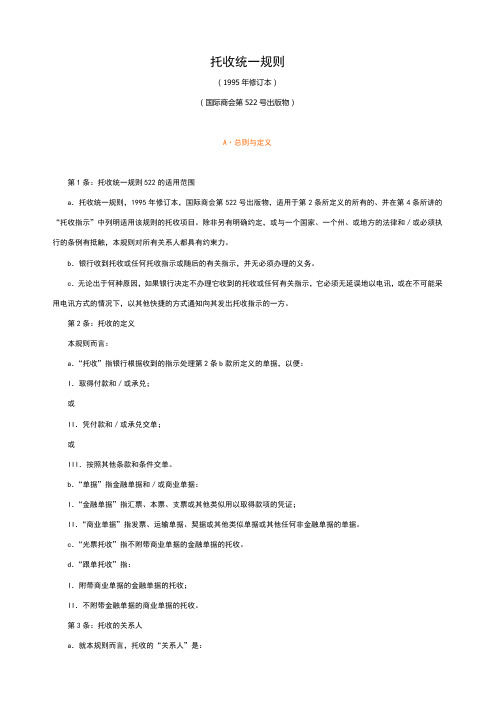
托收统一规则(1995年修订本)(国际商会第522号出版物)A·总则与定义第1条:托收统一规则522的适用范围a.托收统一规则,1995年修订本,国际商会第522号出版物,适用于第2条所定义的所有的、并在第4条所讲的“托收指示”中列明适用该规则的托收项目。
除非另有明确约定,或与一个国家、一个州、或地方的法律和/或必须执行的条例有抵触,本规则对所有关系人都具有约束力。
b.银行收到托收或任何托收指示或随后的有关指示,并无必须办理的义务。
c.无论出于何种原因,如果银行决定不办理它收到的托收或任何有关指示,它必须无延误地以电讯,或在不可能采用电讯方式的情况下,以其他快捷的方式通知向其发出托收指示的一方。
第2条:托收的定义本规则而言:a.“托收”指银行根据收到的指示处理第2条b款所定义的单据,以便:I.取得付款和/或承兑;或II.凭付款和/或承兑交单;或III.按照其他条款和条件交单。
b.“单据”指金融单据和/或商业单据:I.“金融单据”指汇票、本票、支票或其他类似用以取得款项的凭证;II.“商业单据”指发票、运输单据、契据或其他类似单据或其他任何非金融单据的单据。
c.“光票托收”指不附带商业单据的金融单据的托收。
d.“跟单托收”指:I.附带商业单据的金融单据的托收;II.不附带金融单据的商业单据的托收。
第3条:托收的关系人a.就本规则而言,托收的“关系人”是:I.“委托人”:委托银行办理托收的一方;II.“托收行”:委托人委以办理托收的银行;III.“代收行”:除托收行以外的任何参与处理托收的银行;IV.“提示行”:向付款人提示单据的代收银行。
b.“付款人”是根据托收指示被提示单据的人。
B·托收的形式和结构第4条:托收指示a.I.所有托收单据必须附带托收指示,注明该项托收遵循托收统一规则522,应完整而明确的条款。
银行只被允许根据托收指示中的条款和本规则行事。
II.银行将不会为了取得指示而审核单据。
托收统一规则URC522中英文版6
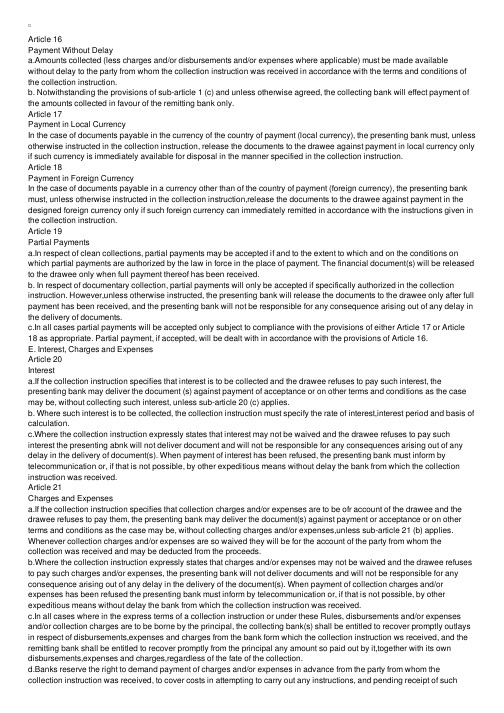
Article 16Payment Without Delaya.Amounts collected (less charges and/or disbursements and/or expenses where applicable) must be made available without delay to the party from whom the collection instruction was received in accordance with the terms and conditions of the collection instruction.b. Notwithstanding the provisions of sub-article 1 (c) and unless otherwise agreed, the collecting bank will effect payment of the amounts collected in favour of the remitting bank only.Article 17Payment in Local CurrencyIn the case of documents payable in the currency of the country of payment (local currency), the presenting bank must, unless otherwise instructed in the collection instruction, release the documents to the drawee against payment in local currency only if such currency is immediately available for disposal in the manner specified in the collection instruction.Article 18Payment in Foreign CurrencyIn the case of documents payable in a currency other than of the country of payment (foreign currency), the presenting bank must, unless otherwise instructed in the collection instruction,release the documents to the drawee against payment in the designed foreign currency only if such foreign currency can immediately remitted in accordance with the instructions given in the collection instruction.Article 19Partial Paymentsa.In respect of clean collections, partial payments may be accepted if and to the extent to which and on the conditions on which partial payments are authorized by the law in force in the place of payment. The financial document(s) will be released to the drawee only when full payment thereof has been received.b. In respect of documentary collection, partial payments will only be accepted if specifically authorized in the collection instruction. However,unless otherwise instructed, the presenting bank will release the documents to the drawee only after full payment has been received, and the presenting bank will not be responsible for any consequence arising out of any delay in the delivery of documents.c.In all cases partial payments will be accepted only subject to compliance with the provisions of either Article 17 or Article18 as appropriate. Partial payment, if accepted, will be dealt with in accordance with the provisions of Article 16.E. Interest, Charges and ExpensesArticle 20Interesta.If the collection instruction specifies that interest is to be collected and the drawee refuses to pay such interest, the presenting bank may deliver the document (s) against payment of acceptance or on other terms and conditions as the case may be, without collecting such interest, unless sub-article 20 (c) applies.b. Where such interest is to be collected, the collection instruction must specify the rate of interest,interest period and basis of calculation.c.Where the collection instruction expressly states that interest may not be waived and the drawee refuses to pay such interest the presenting abnk will not deliver document and will not be responsible for any consequences arising out of any delay in the delivery of document(s). When payment of interest has been refused, the presenting bank must inform by telecommunication or, if that is not possible, by other expeditious means without delay the bank from which the collection instruction was received.Article 21Charges and Expensesa.If the collection instruction specifies that collection charges and/or expenses are to be ofr account of the drawee and the drawee refuses to pay them, the presenting bank may deliver the document(s) against payment or acceptance or on other terms and conditions as the case may be, without collecting charges and/or expenses,unless sub-article 21 (b) applies. Whenever collection charges and/or expenses are so waived they will be for the account of the party from whom the collection was received and may be deducted from the proceeds.b.Where the collection instruction expressly states that charges and/or expenses may not be waived and the drawee refuses to pay such charges and/or expenses, the presenting bank will not deliver documents and will not be responsible for any consequence arising out of any delay in the delivery of the document(s). When payment of collection charges and/or expenses has been refused the presenting bank must inform by telecommunication or, if that is not possible, by other expeditious means without delay the bank from which the collection instruction was received.c.In all cases where in the express terms of a collection instruction or under these Rules, disbursements and/or expenses and/or collection charges are to be borne by the principal, the collecting bank(s) shall be entitled to recover promptly outlays in respect of disbursements,expenses and charges from the bank form which the collection instruction ws received, and the remitting bank shall be entitled to recover promptly from the principal any amount so paid out by it,together with its own disbursements,expenses and charges,regardless of the fate of the collection.d.Banks reserve the right to demand payment of charges and/or expenses in advance from the party from whom the collection instruction was received, to cover costs in attempting to carry out any instructions, and pending receipt of suchpayment also reserve the right not to carry out such instructions.F. Other ProvisionsArticle 22AcceptanceThe presenting bank is responsible for seeing that the form of the acceptance of a bill of exchange appears to be complete and correct, but is not responsible for the genuineness of any signature or for the authority of any signatory to sign the acceptance.Article 23Promissory Notes and Other InstructionsThe presenting bank is not responsible fo the genuineness of any signature or for the authority of any signature to sign a promissory note, receipt,or other instruments.Article 24ProtestThe collection instruction should give specific instructions regarding protest (or other legal process in lieu thereof), in the event of non-payment or non-acceptance.In the absence of such specific instructions, the banks concerned with the collection have no obligation to have the document(s) protested (or subjected to other legal process in lieu thereof) for non-payment or non-acceptance.Any charges and/or expenses incurred by banks in connection with such protest, or other legal process,will be for the account of the party from whom the collection instruction was received.Article 25Case-of-NeedIf the principal nominates a representative to act as case-of-need in the event of non-payment and/or non-acceptance the collection instruction should clearly and fully indicate the powers of such case-of-need. In the absence of such indication banks will not accept any instructions from the case-of-need.Article 26AdvicesCollecting banks are to advise fate in accordance with the following rules:a.Form of AdviseAll advices of information from the collecting bank to the bank from which the collection instruction was received, must bear appropriate details including, in all cases,the latter bank’s reference as stated in the collection instruction.b.Method of AdviceIt shall be the responsibility of the remitting bank to instruct the collecting bank regarding the method by which the advices detailed in (c) i, (c) ii and (c) iii are to be given. In the absence of such instructions, the collecting bank will send the relative advices by the method of its choice at the expense of the bank from which the collection instruction was received.c. i. Advice of PaymentThe collecting bank must send without delay advice of payment to the bank from which the collection instruction was received, detailing the amount or amounts collected,charges and/or disbursements and/or expenses deducted, where appropriate, and method of disposal of the funds.ii.Advice of AcceptanceThe collecting bank must send without delay advice of acceptance to the bank from which the collection instruction was received.iii.Advice of Non-payment and/or Non-acceptanceThe presenting bank should endeavour to ascertain the reasons for non-payment and/or non-acceptance and advise accordingly, without delay,the bank from which it received the collection instruction.The presenting bank must send without delay advice of non-payment and/or advice of non-acceptance to the bank form which it received the collection instruction.On receipt of such advice the remitting bank must give appropriate instructions as to the further handling of the documents. If such instructions are not received by the presenting bank within 60 days after its advice of non-payment and/or non-acceptance, the documents may be returned to the bank from which the collection instruction was received without any further responsibility on the part of the presenting bank.。
国际商会托收统一规则
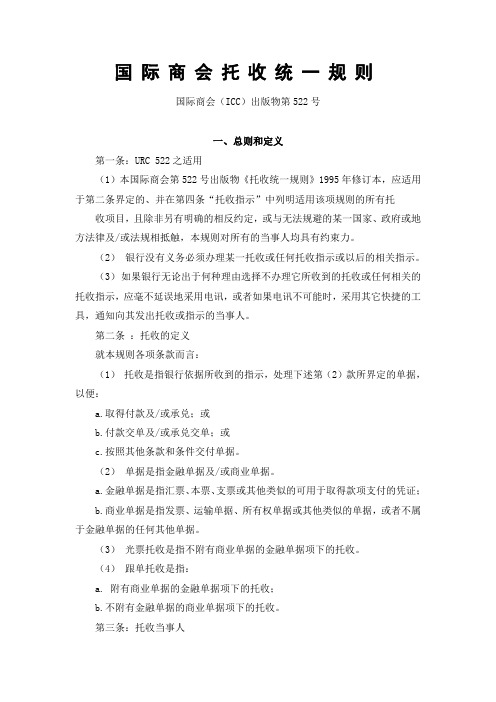
国际商会托收统一规则国际商会(ICC)出版物第522号一、总则和定义第一条:URC 522之适用(1)本国际商会第522号出版物《托收统一规则》1995年修订本,应适用于第二条界定的、并在第四条“托收指示”中列明适用该项规则的所有托收项目,且除非另有明确的相反约定,或与无法规避的某一国家、政府或地方法律及/或法规相抵触,本规则对所有的当事人均具有约束力。
(2)银行没有义务必须办理某一托收或任何托收指示或以后的相关指示。
(3)如果银行无论出于何种理由选择不办理它所收到的托收或任何相关的托收指示,应毫不延误地采用电讯,或者如果电讯不可能时,采用其它快捷的工具,通知向其发出托收或指示的当事人。
第二条:托收的定义就本规则各项条款而言:(1)托收是指银行依据所收到的指示,处理下述第(2)款所界定的单据,以便:a.取得付款及/或承兑;或b.付款交单及/或承兑交单;或c.按照其他条款和条件交付单据。
(2)单据是指金融单据及/或商业单据。
a.金融单据是指汇票、本票、支票或其他类似的可用于取得款项支付的凭证;b.商业单据是指发票、运输单据、所有权单据或其他类似的单据,或者不属于金融单据的任何其他单据。
(3)光票托收是指不附有商业单据的金融单据项下的托收。
(4)跟单托收是指:a. 附有商业单据的金融单据项下的托收;b.不附有金融单据的商业单据项下的托收。
第三条:托收当事人(1)就本规则各项条款而言,托收当事人有:a.委托人,即委托银行办理托收的当事人;b.托收行,即委托人委托办理托收的银行;c.代收行,即除托收行以外的任何参与处理托收业务的任何银行;d. 提示行,即向付款人提示单据的代收行。
(2)付款人,即根据托收指示向其提示单据的人。
二、托收的形式和结构第四条:托收指示(1) a.所有送往托收的单据必须附有一项托收指示,注明该项托收将遵循《托收统一规则》第522号出版物,并列出完整和明确的指示。
银行只准根据该托收指示中的命令和本规则行事;b.银行将不会为了取得指示而审核单据;c.除非托收指示中另有授权,银行将不理会向其发出托收的任何当事人/银行以外的任何当事人/银行的任何指示。
托收统一规则URC522 中英文版
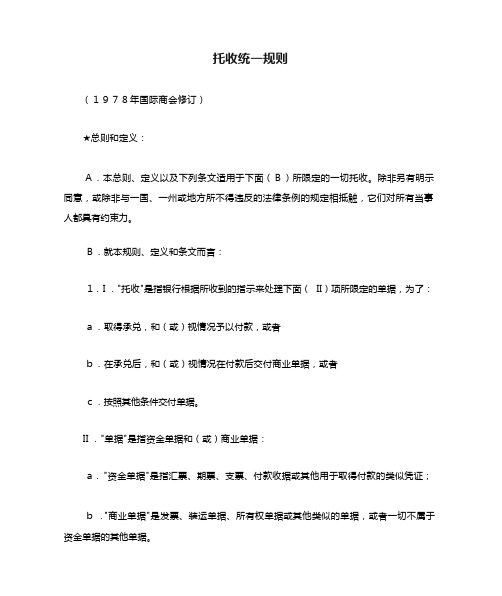
托收统一规则(1978年国际商会修订)★总则和定义:A.本总则、定义以及下列条文适用于下面(B)所限定的一切托收。
除非另有明示同意,或除非与一国、一州或地方所不得违反的法律条例的规定相抵触,它们对所有当事人都具有约束力。
B.就本规则、定义和条文而言:1. I ."托收"是指银行根据所收到的指示来处理下面(II)项所限定的单据,为了:a.取得承兑,和(或)视情况予以付款,或者b.在承兑后,和(或)视情况在付款后交付商业单据,或者c.按照其他条件交付单据。
II ."单据"是指资金单据和(或)商业单据:a. "资金单据"是指汇票、期票、支票、付款收据或其他用于取得付款的类似凭证;b."商业单据"是发票、装运单据、所有权单据或其他类似的单据,或者一切不属于资金单据的其他单据。
III ."光票托收"是指资金单据的托收,不附有商业单据。
Ⅳ."跟单托收"是指:a.资金单据的托收,附有商业单据;b.商业单据的托收,不附有资金单据。
2. "有关当事人"是指:I ."委托人" ,是指委托银行,办理托收业务的客户;II ."委托行" ,是指受委托人的委托,办理托收业务的银行;III ."代收?是指除委托行以外,参与办理托收指示的任何银行;Ⅳ."提示行"是指向付款人作出指示的代收行。
3. "受票人" ,就是根据托收指示书,向其作出提示的人。
c.送交托收的一切单据,必须附有一份完整的明确的托收指示书。
银行只被允许按照托收指示书中的规定和根据本规则行事。
如出于某种原因,某一银行不能执行它所收到的托收指示书的规定时,必须立即通知发出托收指示书的一方。
★义务和责任第一条银行应以善意和合理的谨慎行事。
第二条银行必须核实所收到的单据在表面上与托收指示书所列一致,如发现任何单据有遗漏,应即通知发出指示的一方。
《托收统一规则》URC522
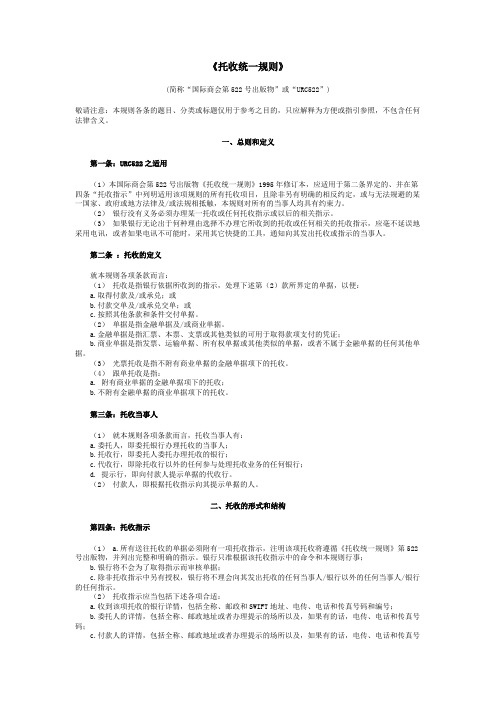
《托收统一规则》(简称“国际商会第522号出版物”或“URC522”)敬请注意:本规则各条的题目、分类或标题仅用于参考之目的,只应解释为方便或指引参照,不包含任何法律含义。
一、总则和定义第一条:URC522之适用(1)本国际商会第522号出版物《托收统一规则》1995年修订本,应适用于第二条界定的、并在第四条“托收指示”中列明适用该项规则的所有托收项目,且除非另有明确的相反约定,或与无法规避的某一国家、政府或地方法律及/或法规相抵触,本规则对所有的当事人均具有约束力。
(2)银行没有义务必须办理某一托收或任何托收指示或以后的相关指示。
(3)如果银行无论出于何种理由选择不办理它所收到的托收或任何相关的托收指示,应毫不延误地采用电讯,或者如果电讯不可能时,采用其它快捷的工具,通知向其发出托收或指示的当事人。
第二条:托收的定义就本规则各项条款而言:(1)托收是指银行依据所收到的指示,处理下述第(2)款所界定的单据,以便:a.取得付款及/或承兑;或b.付款交单及/或承兑交单;或c.按照其他条款和条件交付单据。
(2)单据是指金融单据及/或商业单据。
a.金融单据是指汇票、本票、支票或其他类似的可用于取得款项支付的凭证;b.商业单据是指发票、运输单据、所有权单据或其他类似的单据,或者不属于金融单据的任何其他单据。
(3)光票托收是指不附有商业单据的金融单据项下的托收。
(4)跟单托收是指:a. 附有商业单据的金融单据项下的托收;b.不附有金融单据的商业单据项下的托收。
第三条:托收当事人(1)就本规则各项条款而言,托收当事人有:a.委托人,即委托银行办理托收的当事人;b.托收行,即委托人委托办理托收的银行;c.代收行,即除托收行以外的任何参与处理托收业务的任何银行;d. 提示行,即向付款人提示单据的代收行。
(2)付款人,即根据托收指示向其提示单据的人。
二、托收的形式和结构第四条:托收指示(1) a.所有送往托收的单据必须附有一项托收指示,注明该项托收将遵循《托收统一规则》第522号出版物,并列出完整和明确的指示。
URC522-chinese version

URC522URC522是国际商会于1979年1月号发布《托收统一规则》,一切国际商业贸易的托收规则都是根据本规则执行。
这个规则的效率与L/C的UCP600一致,深圳天捷建议各位国际贸易者,只有认真了解URC522,才能更好做好D/P托收操作。
以下是URC522中文版,本URC522中文版选自网络,我司对其翻译客观性与正确性不负担任何责任:托收统一规则(URC522中文版)(1978年国际商会修订)★总则和定义:A.本总则、定义以及下列条文适用于下面(B)所限定的一切托收。
除非另有明示同意,或除非与一国、一州或地方所不得违反的法律条例的规定相抵触,它们对所有当事人都具有约束力。
B.就本规则、定义和条文而言:1.I."托收"是指银行根据所收到的指示来处理下面(II)项所限定的单据,为了:a.取得承兑,和(或)视情况予以付款,或者b.在承兑后,和(或)视情况在付款后交付商业单据,或者c.按照其他条件交付单据。
II."单据"是指资金单据和(或)商业单据:a."资金单据"是指汇票、期票、支票、付款收据或其他用于取得付款的类似凭证;b."商业单据"是发票、装运单据、所有权单据或其他类似的单据,或者一切不属于资金单据的其他单据。
III."光票托收"是指资金单据的托收,不附有商业单据。
Ⅳ."跟单托收"是指:a.资金单据的托收,附有商业单据;b.商业单据的托收,不附有资金单据。
2."有关当事人"是指:I."委托人",是指委托银行,办理托收业务的客户;II."委托行",是指受委托人的委托,办理托收业务的银行;III."代收?是指除委托行以外,参与办理托收指示的任何银行;Ⅳ."提示行"是指向付款人作出指示的代收行。
托收统一规则URC522中英文版5

f. If the remitting bank does not nominate a specific presenting bank, the collecting bank may utilize a presenting bank of its choice.Article 6Sight/AcceptanceIn the case of documents payable at sight the presenting bank must make presentation for payment without delay.In the case of documents payable at a tenor other than sight the presenting bank must, where acceptance is called for, make presentation for acceptance without delay, and where payment is called for, make presentation for payment not later than the appropriate maturity date.Article 7Release of Commercial DocumentsDocuments Against Acceptance (D/A) vs. Documents Against Payment (D/P)a.Collection should not contain bills of exchange payable at a future date with instruction that commercial documents are to be delivered against payment.b. If a collection contains a bill of exchange payable at a future date, the collection instruction should state whether the commercial documents are to be released to the drawee against acceptance (D/A) or against payment (D/P).In the absence of such statement commercial documents will be released only against payment and the collecting bank will not be responsible for any consequences arising out of any delay in the delivery of documents.c. If a collection contains a bill of exchange payable at a future date and the collection instruction indicates that commercial documents are to be released against payment, documents will be released only against such payment and the collecting bank will not be responsible for any consequences arising out of any delay in the delivery of documents.Article 8Creation of DocumentsWhere the remitting bank instructs that either the collecting bank or the drawee is to create documents (bills of exchange promissory notes, trust receipts,letters of undertaking or other documents) that were not included in the collection, the form and wording of such documents shall be provided by the remitting bank, otherwise the collecting bank shall not be liable or responsible for the form and wording of any such document provided by the collecting bank and/or the drawee.C. Liabilities and ResponsibilitiesGood faith and Reasonable CareBanks will act in good faith and exercise reasonable care.Article 10Documents vs. Goods/Services/Performancesa.Goods should not be dispatched directly to the address of a bank or consigned to or to the order of a bank without prior agreement on the part of that bank.Nvertheless, in the event that goods are dispatched directly to the address of a bank or consigned to or to the order of a bank for release to a drawee against payment or acceptance or upon other terms and conditions without prior agreement on the part of that bank, such bank shall have no obligation to take delivery of the goods, which remain at the risk and responsibility of the party dispatching the goods.b. Banks have no obligation to take any action in respect of the goods to which a documentary collection relates, including storage and insurance of the goods even when specific instructions are given to do so. Banks will only take such action if, when, and to the extent that they agree to do so in each case, notwithstanding the provisions of sub-article 1 (c), this rule applies even in the absence of any specific advice to this effect by the collecting bank.c. Nevertheless, in the case that banks take action for the protection of the goods, whether instructed or not, they assume no liability or responsibility with regard to the fate and/or condition of the goods and/or for any acts and/or omissions on the part of any third parties entrusted with the custody and/or protection of the goods. However, the collecting bank must advise without delay the bank from which the collection instruction was received of any such action taken.d. Any charges and/or expensed incurred by banks in connection with any action taken to protect the goods will be for the account of the party from whom they received the collection.e. i. Notwithstanding the provisions of sub-article 10 (a), where the goods are consigned to or the order of the collecting bank and the drawee has honoured the collection by payment, acceptance or other terms and conditions, and the collecting bank arranges for the authorized the collecting bank to do so.ii.Where a collecting bank on the instructions of the remitting bank or in terms of sub-article 10 (e) i, arranges for the release of the goods, the remitting bank shall indemnify such collecting bank for all damages and expenses incured.Article 11Disclaimer For Acts of an Instructed Partya. Banks utilizing the services of another bank or other banks for the purposes of giving effect to the instructions of the principal, do so for the account and at the risk of such principal.b. Banks assume no liability or responsibility should the instructions they transmit not be carried out, even if they have themselves taken the initiative in the choice of such other bank(s).c. A party instructing another party to perform services shall be bound by and liable to indemnify the instructed party against all obligations and responsibilities imposed by foreign laws and usages.Article 12Disclaimer on Documents Receiveda.Bank must determine that the documents received appear to be as listed in the collectioninstruction and must advise by telecom-munication or, if that is not possible, by other expeditious means, without delay, the party from whom the collection instruction was received of any documents missing, or found t be other than listed.Banks have no further obligation in this respect.b. If the documents do not appear to be listed, the remitting bank shall be precluded from disputing the type and number of documents received by the collecting bank.c. Subject to sub-article 5 (c) and sub-article 12 (a) and 12 (b) above, banks will present documents as received without further examination.Article 13Disclaimer on Effectiveness of DocumentsBanks assume no liability or responsibility ofr the form, sufficiency,accuracy,genuineness,falsification or legal effect of any document (s) or superimposed thereon; nor do they assume any liability, condition,packing ,delivery, value of existence of the goods represented by any document (s),or for the good faith or acts and/or omission,solvency,performance or standing of the consignors, the carriers,the forwarders,the consignees or the insurers of the goods, or any other person whomsoever. Article 14Disclaimer on Delays,Loss in Transit and Translationa.Banks assume no liability or responsibility for the consequences arising out of delay and/or loss in transit of any message (s), letter(s) or document(s), or for delay,mutilation or other error(s) arising in transmission of any telecommunication or for error(s) in translation and/or interpretation of technical terms.b. Banks will not be liable or responsible for any delays resulting from the need to obtain clarification of any instructions received.Article 15Force MajeureBanks assume no liability or responsibility for consequence arising out of the interruption of their business by Acts of God, riots,civil commotios,insurrections, wars, or any other causes beyond their control or by strikes or lockouts.D. Payment。
国际商会托收统一规则说明(中英文版)
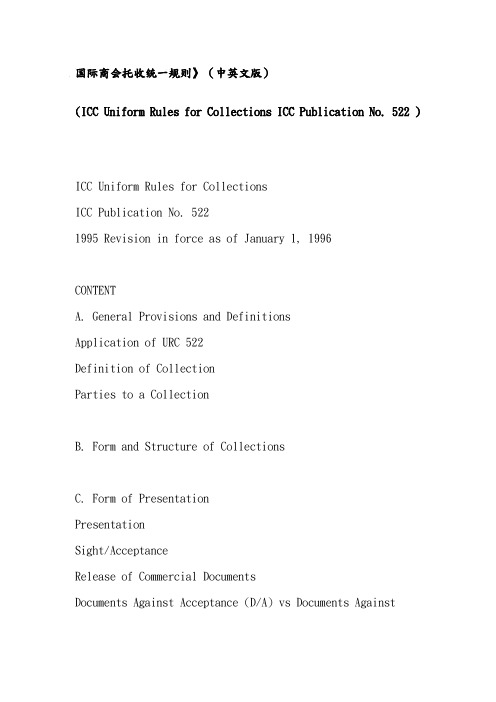
国际商会托收统一规则》(中英文版)(ICC Uniform Rules for Collections ICC Publication No. 522 )ICC Uniform Rules for CollectionsICC Publication No. 5221995 Revision in force as of January 1, 1996CONTENTA. General Provisions and DefinitionsApplication of URC 522Definition of CollectionParties to a CollectionB. Form and Structure of CollectionsC. Form of PresentationPresentationSight/AcceptanceRelease of Commercial DocumentsDocuments Against Acceptance (D/A) vs Documents AgainstPayment (D/P)Creation of DocumentsD. Liabilities and ResponsibilitiesGood Faith and Reasonable CareDocuments vs. Goods/Services/PerformancesDisclaimer for Acts of an Instructed PartyDisclaimer on Documents ReceivedDisclaimer on Effectiveness of DocumentsDisclaimer on Delays, Loss in Transit and Translation Force MajeureE. PaymentPayment Without DelayPayment in Local CurrencyPayment in Foreign CurrencyPartial PaymentF. Interest, Charges and ExpensesInterestCharges and ExpensesG. Other ProvisionsAcceptancePromissory Notes and other InstructionsProtestCase-of-NeedAdvicesA. General Provisions and Definitions总则和定义Article 1Application of URC 522第一款:《托收统一规则》第522号的应用。
国际商会托收统一规则URC522

国际商会(ICC)出版物522号国际商会托收统一规则ICC Uniform Rules for CollectionsURC 522(ICC CHINA会标)国际商会中国国家委员会(ICC CHINA)组织翻译国际商会托收统一规则URC 522国际商会中国国家委员会(ICC CHINA)组织翻译译者:段东辉译审:李海峰Published in 1995 byICC PUBLISHING S.A.International Chamber of CommerceThe world business organization38 Cours Albert 1er75008 Paris, FranceCopyright © 1995International Chamber of CommerceAll rights reserved. No part of this work may be reproduced or copied in any form or by any means – graphic, electronic or mechanical, including photocopying, recording, taping or information retrieval systems – without written permission of ICC Publishing S.A.ICC Publication No. 522本书系国际商会出版物522号,其英文版由国际商会出版社(ICC Publishing S.A., 38 Cours Albert 1er, 75008 Paris, France)于1995年出版。
版权© 1995国际商会所有权利皆被保留。
未经国际商会出版社书面许可,不得以任何形式和任何方式—图表、电子或机械方式,包括复印、录制或信息提取系统—复制或拷贝本书的任一部分。
[中学]URC522,中英文对照
![[中学]URC522,中英文对照](https://img.taocdn.com/s3/m/b065754355270722192ef7b0.png)
[中学]URC522,中英文对照URC522,中英文对照跟单托收统一规则第522号一、总则和定义Article 1Application of URC 522第一款:《托收统一规则》第522号的应用。
a. The Uniform Rules for Collections, 1995 Revision, ICC Publication No.522, shall apply to all collections as defined in Article 2 where such ru les are incorporated into the text of the “collection instruction” referred to in Article 4 and are binding on all parties thereto unless otherwise expressly agreed or contrary to the provisions of a national, state or local law and/or regulation which cannot be departed from.国际商会第522号出版物《托收统一规则》1995年修订本将适用于第二款所限定的、并在第四款托收指示中列明适用该项规则的所有托收项目。
除非另有明确的约定,或与某一国家、某一政府,或与当地法律和尚在生效的条例有所抵触,本规则对所有的关系人均具有约束力。
b. Banks shall have no obligation to handle either a collection or any collection instruction or subsequent related instructions.银行没有义务必须办理某一托收或任何托收指示或以后的相关指示。
c. If a bank elects, for any reason, not to handle a collection orany related instructions received by it, it must advise the party from whom it received the collection or the instructions by telecommunication or, if that is not possible, by other expeditious means, without delay.如果银行无论出于何种理由选择了不办理它所收到的托收或任何相关的托收指示,它必须毫不延误地采用电讯,或者如果电讯不可能时采用其它快捷的工具向他收到该项指示的当事人发出通知。
托收统一规则URC522中英文版5
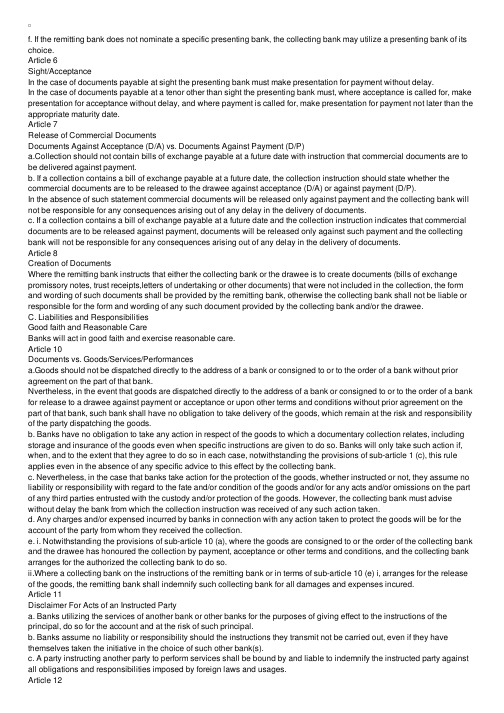
f. If the remitting bank does not nominate a specific presenting bank, the collecting bank may utilize a presenting bank of its choice.Article 6Sight/AcceptanceIn the case of documents payable at sight the presenting bank must make presentation for payment without delay.In the case of documents payable at a tenor other than sight the presenting bank must, where acceptance is called for, make presentation for acceptance without delay, and where payment is called for, make presentation for payment not later than the appropriate maturity date.Article 7Release of Commercial DocumentsDocuments Against Acceptance (D/A) vs. Documents Against Payment (D/P)a.Collection should not contain bills of exchange payable at a future date with instruction that commercial documents are to be delivered against payment.b. If a collection contains a bill of exchange payable at a future date, the collection instruction should state whether the commercial documents are to be released to the drawee against acceptance (D/A) or against payment (D/P).In the absence of such statement commercial documents will be released only against payment and the collecting bank will not be responsible for any consequences arising out of any delay in the delivery of documents.c. If a collection contains a bill of exchange payable at a future date and the collection instruction indicates that commercial documents are to be released against payment, documents will be released only against such payment and the collecting bank will not be responsible for any consequences arising out of any delay in the delivery of documents.Article 8Creation of DocumentsWhere the remitting bank instructs that either the collecting bank or the drawee is to create documents (bills of exchange promissory notes, trust receipts,letters of undertaking or other documents) that were not included in the collection, the form and wording of such documents shall be provided by the remitting bank, otherwise the collecting bank shall not be liable or responsible for the form and wording of any such document provided by the collecting bank and/or the drawee.C. Liabilities and ResponsibilitiesGood faith and Reasonable CareBanks will act in good faith and exercise reasonable care.Article 10Documents vs. Goods/Services/Performancesa.Goods should not be dispatched directly to the address of a bank or consigned to or to the order of a bank without prior agreement on the part of that bank.Nvertheless, in the event that goods are dispatched directly to the address of a bank or consigned to or to the order of a bank for release to a drawee against payment or acceptance or upon other terms and conditions without prior agreement on the part of that bank, such bank shall have no obligation to take delivery of the goods, which remain at the risk and responsibility of the party dispatching the goods.b. Banks have no obligation to take any action in respect of the goods to which a documentary collection relates, including storage and insurance of the goods even when specific instructions are given to do so. Banks will only take such action if, when, and to the extent that they agree to do so in each case, notwithstanding the provisions of sub-article 1 (c), this rule applies even in the absence of any specific advice to this effect by the collecting bank.c. Nevertheless, in the case that banks take action for the protection of the goods, whether instructed or not, they assume no liability or responsibility with regard to the fate and/or condition of the goods and/or for any acts and/or omissions on the part of any third parties entrusted with the custody and/or protection of the goods. However, the collecting bank must advise without delay the bank from which the collection instruction was received of any such action taken.d. Any charges and/or expensed incurred by banks in connection with any action taken to protect the goods will be for the account of the party from whom they received the collection.e. i. Notwithstanding the provisions of sub-article 10 (a), where the goods are consigned to or the order of the collecting bank and the drawee has honoured the collection by payment, acceptance or other terms and conditions, and the collecting bank arranges for the authorized the collecting bank to do so.ii.Where a collecting bank on the instructions of the remitting bank or in terms of sub-article 10 (e) i, arranges for the release of the goods, the remitting bank shall indemnify such collecting bank for all damages and expenses incured.Article 11Disclaimer For Acts of an Instructed Partya. Banks utilizing the services of another bank or other banks for the purposes of giving effect to the instructions of the principal, do so for the account and at the risk of such principal.b. Banks assume no liability or responsibility should the instructions they transmit not be carried out, even if they have themselves taken the initiative in the choice of such other bank(s).c. A party instructing another party to perform services shall be bound by and liable to indemnify the instructed party against all obligations and responsibilities imposed by foreign laws and usages.Article 12Disclaimer on Documents Receiveda.Bank must determine that the documents received appear to be as listed in the collectioninstruction and must advise by telecom-munication or, if that is not possible, by other expeditious means, without delay, the party from whom the collection instruction was received of any documents missing, or found t be other than listed.Banks have no further obligation in this respect.b. If the documents do not appear to be listed, the remitting bank shall be precluded from disputing the type and number of documents received by the collecting bank.c. Subject to sub-article 5 (c) and sub-article 12 (a) and 12 (b) above, banks will present documents as received without further examination.Article 13Disclaimer on Effectiveness of DocumentsBanks assume no liability or responsibility ofr the form, sufficiency,accuracy,genuineness,falsification or legal effect of any document (s) or superimposed thereon; nor do they assume any liability, condition,packing ,delivery, value of existence of the goods represented by any document (s),or for the good faith or acts and/or omission,solvency,performance or standing of the consignors, the carriers,the forwarders,the consignees or the insurers of the goods, or any other person whomsoever. Article 14Disclaimer on Delays,Loss in Transit and Translationa.Banks assume no liability or responsibility for the consequences arising out of delay and/or loss in transit of any message (s), letter(s) or document(s), or for delay,mutilation or other error(s) arising in transmission of any telecommunication or for error(s) in translation and/or interpretation of technical terms.b. Banks will not be liable or responsible for any delays resulting from the need to obtain clarification of any instructions received.Article 15Force MajeureBanks assume no liability or responsibility for consequence arising out of the interruption of their business by Acts of God, riots,civil commotios,insurrections, wars, or any other causes beyond their control or by strikes or lockouts.D. Payment。
- 1、下载文档前请自行甄别文档内容的完整性,平台不提供额外的编辑、内容补充、找答案等附加服务。
- 2、"仅部分预览"的文档,不可在线预览部分如存在完整性等问题,可反馈申请退款(可完整预览的文档不适用该条件!)。
- 3、如文档侵犯您的权益,请联系客服反馈,我们会尽快为您处理(人工客服工作时间:9:00-18:30)。
国际商会托收统一规则(URC522)(中文版)
()
国际商会调解
国际商会仲裁范围
国际商会仲裁规则
国际商会争议解决
国际贸易法
国际商会托收统一规则(URC 522) 一、总则和定义第一款:《托收统一规则》第522号的应用。
(1)国际商会第522号出版物《托收统一规则》1995年修订本将适用于第二款所限定的、并在第四款托收指示中列明适用该项规则的所有托收项目。
除非另有明确的约定,或与某一国家
国际商会托收统一规则(URC 522)
一、总则和定义
第一款:《托收统一规则》第522号的应用。
国际商会第522号出版物《托收统一规则》1995年修订本将适用于第二款所限定的、并在第四款托收指示中列明适用该项规则的所有托收项目。
除非另有明确的约定,或与某一国家、某一政府,或与当地法律和尚在生效的条例有所抵触,本规则对所有的关系人均具有约束力。
(2)银行没有义务必须办理某一托收或任何托收指示或以后的相关指示。
如果银行无论出于何种理由选择了不办理它所收到的托收或任何相关的托收指示,它必须毫不延误地采用电讯,或者如果电讯不可能时采用其它快捷的工具向他收到该项指示的当事人发出通知。
第二款托收的定义
就本条款而言:
(1)托收是指银行依据所收到的指示处理下述(2)款所限定的单据,以便于:
a.取得付款和/或承兑;或
b.凭以付款或承兑交单;或
c.按照其他条款和条件交单。
(2)单据是指金融单据和/或商业单据。
a.金融单据是指汇票、本票、支票或其他类似的可用于取得款项支付的凭证;
b.商业单据是指发票、运输单据、所有权文件或其他类似的文件,或者不属于金融单据的任何其他单据。
(3)光票托收是指不附有商业单据的金融单据项下的托收。
(4)跟单托收是指:
a. 附有商业单据的金融单据项下的托收;
b.不附有金融单据的商业单据项下的托收。
第三款托收的关系人
(1)就本条款而言,托收的关系人有:
a.委托人即委托银行办理托收的有关人;
b.寄单行即委托人委托办理托收的银行;
c.代收行即除寄单行以外的任何参与处理托收业务的任何银行;
(2)付款人即根据托收指示向其提示单据的人。
二、托收的形式和结构
第四款托收指示
a.所有送往托收的单据必须附有一项托收指示,注明该项托收将遵循《托收统一规则》第522号文件并且列出完整和明确的指示。
银行只准允根据该托收指示中的命令和本规则行事;
b.银行将不会为了取得指示而审核单据;
c.除非托收指示中另有授权,银行将不理会来自除了他所收到托收的有关人/银行以外的任何有关人/银行的任何指令。
(2)托收指示应当包括下述适宜的各项内容:
a.收到该项托收的银行详情,包括全称、邮政和SWIFT地址、电传、电话和传真号码和编号;
b.委托人的详情包括全称、邮政地址或者办理提示的场所以及,如果有的话,电传、电话和传真号码;
c.付款人的详情包括全称、邮政地址或者办理提示的场所以及,如果有的话,电传、电话和传真号码;
d.提示银行(如有的话)的详情,包括全称、邮政地址以及,如果有的话,电传和传真号码;
e.待托收的金额和货币;
f.所附单据清单和每份单据的份数;
g.i.凭以取得付款和/或承兑和条件和条款;
ii.凭以交付单据的条件
付款和/或承兑
其他条件和条款
缮制托收指示的有关方应有责任清楚无误地说明,确保单据交付的条件,否则的话,银行对此所产生的任何后果将不承担责任;
待收取的手续费指明是否可以放弃;
i.待收取的利息,如有的话,指明是否可以放弃,包括利率、计息期、适用的计算期基数(如一年按360天还是365天);
j.付款方法和付款通知的形式;
k.发生不付款、不承兑和/或与其他批示不相符时的指示。
(3)a.托收指示应载明付款人或将要办理提示场所的完整地址。
如果地址不全或有错误,代收银行可尽力去查明恰当的地址,但其本身并无义务和责任。
b.代收银行对因所提供地址不全或有误所造成的任何延误将不承担责任或对其负责。
三、提示的形式
第五款提示
(1)就本条款而言,提示是表示银行按照指示使单据对付款人发生有效用的程序。
(2)托收指示应列明付款人将要采取行动的确切期限。
诸如首先、迅速、立即和类似的表述不应用于提示、或付款人赎单采取任何其他行动的任何期限。
如果采用了该类术语,银
行将不予理会。
(3)单据必须以银行收到时的形态向付款人提示,除非被授权贴附任何必需的印花、除非另有指示费用由向其发出托收的有关方支付以及被授权采取任何必要的背书或加盖橡皮戳记,或其他托收业务惯用的和必要的辨认记号或符号。
(4)为了使委托人的指示得以实现,寄单行将以委托人所指定的银行作为代收行。
在未指定代收行时,寄单行将使用他自身的任何银行或者在付款或承兑的国家中,或在必须遵守其他条件的国家中选择另外的银行。
(5)单据和托收指示可以由寄单行直接或者通过;另一银行作为中间银行寄送给代收行。
(6)如果寄单行未指定某一特定的提示行,代办行可自行选择提示行。
第六款即期/承兑
如果是见单即付的单据,提示行必须立即办理提示付款不得延误;如果不是即期而是远期付款单据,提示行必须在不晚于应到期日,如是要承兑立即办理提示承兑、如是付款时立即办理提示付款。
第七款商业单据的交单(承兑交单D/A和付款交单D/P)
(1)附有商业单据必须在付款时交出的托收指示,不应包含远期付款的汇票。
(2)如果托收包含有远期付款的汇票,托收指示应列明商业单据是凭承兑不是凭付款交给付款人。
如果未有说明,商业单据只能是付款交单,而代收行对由于交付单据的任何延误所产生的任何后果将不承担责任。
(3)如果托收包含有远期付款的汇票而且托收指示列明应凭付款交出商业单据时,则单据只能凭该项付款才能交付,而代收行对由于交单的任何延误所产生的任何结果将不承担责任。
第八款代制单据
在寄单行指示或者是代收行或者是付款人应代制托收中未曾包括的单据(汇票、本票、信托收据、保证书或其他单据)时,这些单据的格式和词句应由寄单行提供,否则的话,代收行对由代收行和/或付款人所提供任何该种单据的格式和词句将不承担责任或对其负责。
四、义务和责任
第九款善意和合理的谨慎。
